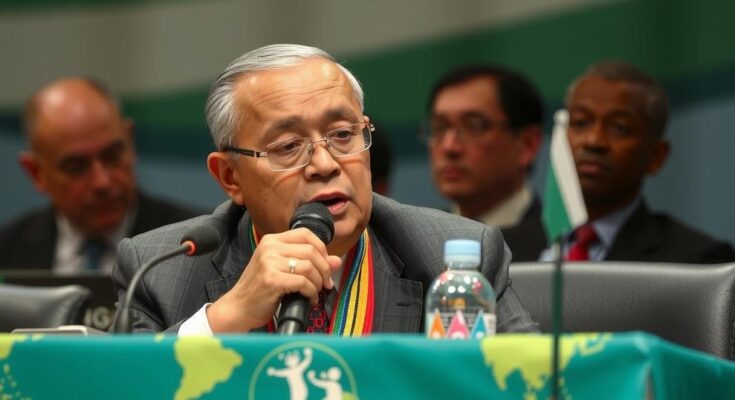In Lesotho, UN Secretary-General António Guterres urged wealthy nations to fulfill climate finance commitments to support poorer countries battling climate change. His visit highlighted the impact of climate change, particularly in Africa, which suffers despite contributing minimally to global emissions. Guterres advocated for increased funding, establishment of a functional Loss and Damage Fund, and greater African representation in the U.N. Security Council.
During a speech to Lesotho’s Parliament, United Nations Secretary-General Antonio Guterres called on wealthy nations to fulfill their financial commitments to assist poorer countries in combatting climate change. Guterres, who is currently on a three-day visit to southern Africa, emphasized Africa’s minimal contribution to global emissions but highlighted its severe vulnerability to climate impacts, particularly as regions like Southern Africa face devastating droughts and food crises.
Recently, an agreement was reached at U.N. climate discussions to allocate at least $300 billion annually to aid developing nations in adaptation and response efforts. However, this figure is significantly below the over $1 trillion requested by developing countries. “Developed countries must meet their commitments … and deliver the promised $300 billion annually for climate finance,” Guterres asserted while addressing the Lesotho lawmakers. He also underscored the necessity for the Loss and Damage Fund to be swiftly operationalized and generously financed by those most prone to climate destruction.
Lesotho and other Southern African nations are grappling with one of the worst droughts on record, intensifying hunger crises affecting more than 27 million individuals. Although partly attributed to the El Niño phenomenon, many climate-related challenges, including cholera outbreaks and flooding, are exacerbated by climate change. Guterres reiterated that African nations are losing up to 5% of their GDP annually due to these climate adversities.
In addition to discussions on climate finance, Guterres expressed hopes for establishing African permanent seats on the U.N. Security Council by the conclusion of his term in December 2026. He criticized the continued exclusion of African representation in this global decision-making forum, referring to it as a lingering remnant of colonialism. On Friday, Guterres will visit the Katse Dam, which is critical for water management projects in Lesotho.
The article addresses a pivotal moment in climate dialogue as UN Secretary-General Antonio Guterres visited Lesotho, emphasizing the urgent need for financial commitments from developed nations to support poorer countries battling climate change. Rich nations had previously agreed to provide climate finance, but the allocated amount fell significantly short of what was actually needed. This visit comes amidst severe drought conditions affecting Southern Africa, heightening the urgency for climate action and support, particularly for vulnerable nations like Lesotho.
In conclusion, Secretary-General Antonio Guterres’s visit to Lesotho underscores a crucial appeal for developed nations to adhere to climate finance commitments, emphasizing the pressing challenges faced by African nations due to climate change. The call for structural changes within the U.N. Security Council authority further emphasizes the need for greater representation of Africa in global decision-making. Efforts to operationalize the Loss and Damage Fund and provide the promised financial support will be vital in mitigating the impacts of climate change on disadvantaged communities.
Original Source: www.independent.co.uk




